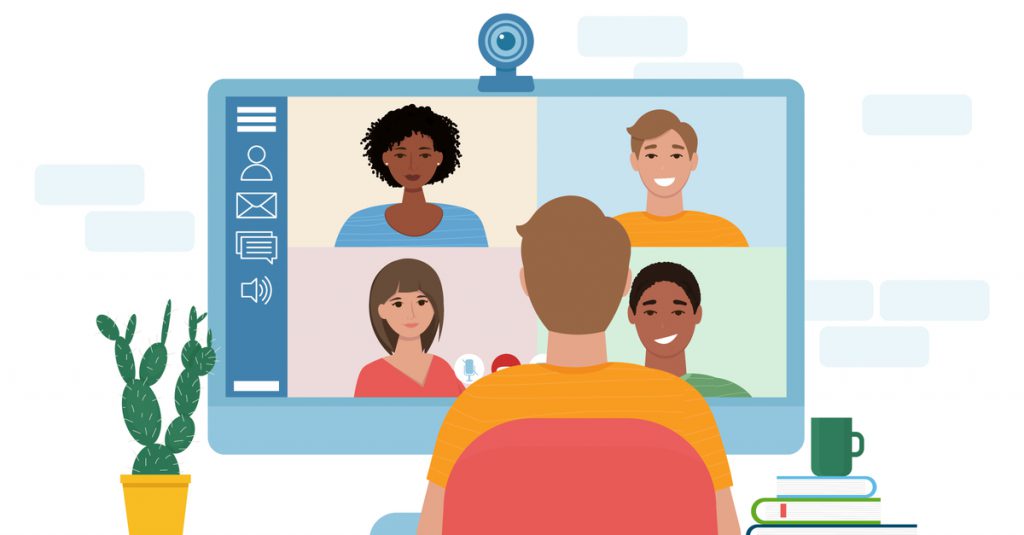Video conferencing in healthcare: how to be a great host (part 2)
As a consultant anaesthetist, I’ve hosted a number of video conferences over the past few months. So, here’s part two of my top tips on how to be a great video conferencing host in healthcare! If you haven’t already read part one, click here first!
Now, where were we?

5. Hosting is an active process – you may need a friend
A great remote meeting should always flow well. Attendees should feel able to contribute, discuss and agree outcomes. You want to increase the confidence of your attendees, assuring them that your meetings work and are worth their time. In turn, this will help to drive the momentum and engagement of your future meetings.
Creating meetings like these is no accident and requires the host to actively manage the meeting. It is a good idea, even for relatively small meetings, to enlist the support of a colleague to co-host or co-chair the meeting. For example, divide up the roles for the meeting, and identify who will monitor the chat and the raising of virtual hands in order to actively bring attendees into the conversation.
Make your presenters look good. It’s important for the flow of the meeting, but it will also instil confidence in other attendees, making them more likely to want to present at your meetings in the future. If your pre-meeting practice with the presenters sharing any media didn’t go too well (e.g. the sharing of media didn’t go well) just share it for them – you will already have it ready to go on your own desktop. Let them concentrate on presenting rather than the tech.
During the meeting use the private chat functionality to prepare presenters. Ready your next presenter by letting them know they will be up next. If they haven’t unmuted themselves be ready to help.
Private chat can also help you bring people into the conversation. Try private messaging someone to let them know you would be interested to hear what their opinion is before coming to them live at the meeting. They know you are going to ask them a question, they have formulated what they are going to say and have unmuted themselves. It all helps with the flow.
Be ready to stimulate debate by asking a question or bring the conversation that may have started on chat into the video conference.

6. Record, record, record!
Active listening, keeping the meeting flowing, managing presenters and reaching agreed outcomes all takes effort. And unless the meeting is a small team meeting it’s unlikely you’ll have the resources to take notes or keep minutes.
Maybe delegate notes to a colleague or, if you have an EA or secretary, invite them to the meeting. If you have recorded the meeting, life becomes so much simpler. Notes can then be made later.
For smaller meetings, it is easy to jot down the attendance but for larger meetings simply record the maximum number of attendees in the minutes. If you really need the names this is a separate job to delegate or simply send out a feedback email/questionnaire post meeting to get a list of names from those who reply.

7. Start & end well
The start time of the meeting is when people usually click the link to join. So I wait for that activity to finish. For a meeting scheduled for 10am I will actually start the meeting proper at 10.05. Just let everyone know that is when we will start and allow 5 mins to admit everyone from the waiting room. Once started, do not recap for late arrivals as it spoils the flow for everyone else.
Don’t have an awkward end that fizzles out. Thank everyone, agree when the next meeting should be scheduled and let everyone know the meeting is ending.

It’s a learning curve for us all, so if you have any advice about hosting remote consultations I’d love to hear it!
Dr Barry Lambert is Medstars co-founder, as well as a consultant anaesthetist at Birmingham Children’s Hospital. View his profile here.
Medstars Medical Concierge Service
Looking for extra guidance when it comes to your healthcare? Sometimes interpreting medical information and making the best decisions can be daunting and complicated. Our private medical concierge service provides easy access to top UK health experts. We guide our patients with genuine choice and trust, offering a bespoke service for anyone in the world seeking private UK healthcare. Learn more about Medstars Medical Concierge Service. Want to learn more about providing our medical concierge service as an employee benefit? Learn more about Medstars Medical Concierge for Business.

